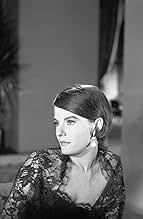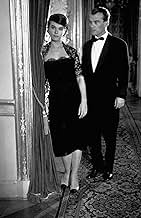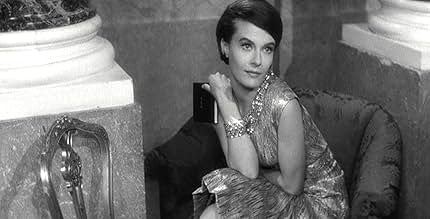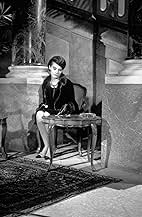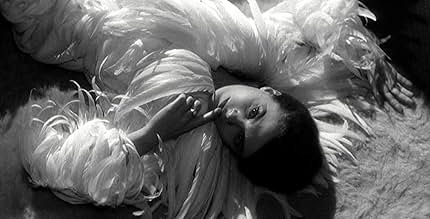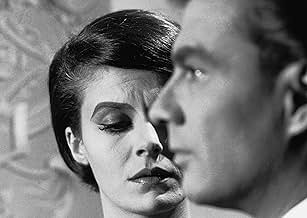CALIFICACIÓN DE IMDb
7.6/10
26 k
TU CALIFICACIÓN
En un extraño y aislado palacete, un hombre conoce a una mujer e intenta convencerla de que se ya se habían conocido antes.En un extraño y aislado palacete, un hombre conoce a una mujer e intenta convencerla de que se ya se habían conocido antes.En un extraño y aislado palacete, un hombre conoce a una mujer e intenta convencerla de que se ya se habían conocido antes.
- Dirección
- Guionista
- Elenco
- Nominado a 1 premio Óscar
- 2 premios ganados y 5 nominaciones en total
Karin Toeche-Mittler
- Un personnage de l'hôtel
- (as Karin Toche-Mittler)
Davide Montemurri
- Un personnage de l'hôtel
- (as Davide Montemuri)
Alan Edwards
- English Introduction
- (sin créditos)
- Dirección
- Guionista
- Todo el elenco y el equipo
- Producción, taquilla y más en IMDbPro
Opiniones destacadas
It would take a braver person than me to delineate what LAST YEAR AT MARIENBAD is `about', but as it is such an entirely thought provoking film, perhaps some sort of `meaning' can come from sharing these thoughts about it. Many people define it as cerebral and classical, but to me it is romantic and gothic. What is remarkable about the setting and the characters is that they are all so wealthy that they can rise above the concerns of ordinary mortals, only to find that this advantaged life brings other problems - of identity, purpose and values. They are strangely existentialist - the existentialism of great wealth - their small talk is intelligent, informed and stilted; they are all beautiful in the sense that money can partly buy beauty, and yet, in the process, they have lost human warmth, real sexual desire, and any purpose in life other than to drift on in their station in life. But desire is a respecter of nobody, and it is this element of human nature that haunts the corridors of the hotel like an invisible mist, and subconsciously their acutely civilised life-style which has bereaved them of something they no longer acknowledge or recognise and have deeply repressed - only to find it lingers on the fringes, confusing and disturbing them - spoiling everything; a depressive dissatisfaction. There is no joy, no enjoyment. The gardens become symbols of this desire to enslave, conquer and exile nature - formal, rigid and planned, and yet within the hotel, all around are decorative symbols of the chaotic and random aspects of nature. Everything appears to carry a symbol that needs to be interpreted - if it is there, it must have meaning, and if the Man says that they had arranged to elope together when they were at Marienbad, (or was it Marienbad, or elsewhere, and what does it matter?), how can the Woman be sure that this is not a ruse, made up to give immediate warning that we exile our emotions at our peril? That to acknowledge this for one second risks opening floodgates which will overwhelm and destroy? Or, that the ultimate expression of desire is death itself, as the film's closing line hints when the Man's voice speaks, over the night time silhouette of the hotel, of, `You.. and me.. together.. always.. in the night'. And it is an eternal night that we all subconsciously know lays in wait for us. The Great Leveller indeed! A remarkable film by any standards, and one which for me at least, is much darker and more sinister than has generally been recognised. But maybe it is just a springboard from which we can all set off on a journey guided by our own subconscious longings and dreads?
The title of Dali's best known work is an apt description of this film. A man meets a woman at a European spa and tries to convince her (and himself) that they met one year ago. While the plot is simple, its presentation is not. I first saw L'annee derniere a Marienbad while taking a French Film class in college. Of the dozen or so films we watched, Marienbad has stayed with me the longest. The nameless protagonist's memories repeat, sometimes minutely changed, sometimes not. The same organ motifs echo again and again, all against the backdrop of elegant hallways and sitting rooms. Through all this, the man attempts to spirit the woman away from her husband/companion, while at the same time establish once and for all what happened last year and what did not. More than any other film, Marienbad has shown me the difference between American film conventions and what else is possible. While so many American releases are rigidly plot driven, Marienbad uses film as a tool for exploration and introspection. Instead of linear story telling, director Resnais allows his characters to explore the details of what may be memory or just imagination. Against a detached, almost stoical background of extras and cool interiors, Delphin Seyrig and Giorgio Albertazzi display a sharp contrast of passion, pleading, and denial. I agree with a previous reviewer that much of the look of Marienbad has been appropriated by commercials for perfume; however, if you haven't seen this film before, you most likely have never seen anything quite so surreal.
My top 5: Alain Robbe-Grillet's "L'Imortelle" takes number 1 (by a landslide), and its a tie between David Lynch's Eraserhead & Blue Velvet for position 3, closely followed by Louis Buñuel's "Andalusian Dog" and Stan Brackage's "Dog Star Man" (which I would have rated number 1, except that I hated that so much I will not give it the satisfaction of being highly rated in any category!) and finally "Koyanisquatsi" which I defy any to explain or justify!
So - Last Year At Marienbad, in a nutshell, assume French Accent:
Verse 1: Man: I know you. Woman: You do not know me. Man: We were here. Woman: I was never here. Chorus: Man: Long strange monologue about the place that they are at, Marienbad. And how he has been here before and how she has been here before. Camera: panning about the ornate Marienbad mansion. Verse 2: (repeat verse 1 - add very interesting game of pick-up sticks) Chorus repeat verses 1 & 2
I think everyone should see this film. I don't know why. I have seen it numerous times. No, I have never seen it. Yes, I saw it last year! No, last year I did not see it. Yes, I saw it here, with me. Wait, I'm alone. Who am I talking to?
So - Last Year At Marienbad, in a nutshell, assume French Accent:
Verse 1: Man: I know you. Woman: You do not know me. Man: We were here. Woman: I was never here. Chorus: Man: Long strange monologue about the place that they are at, Marienbad. And how he has been here before and how she has been here before. Camera: panning about the ornate Marienbad mansion. Verse 2: (repeat verse 1 - add very interesting game of pick-up sticks) Chorus repeat verses 1 & 2
I think everyone should see this film. I don't know why. I have seen it numerous times. No, I have never seen it. Yes, I saw it last year! No, last year I did not see it. Yes, I saw it here, with me. Wait, I'm alone. Who am I talking to?
10debblyst
It's useless to speculate on the "real" meaning of this dream-like movie that is an investigation on the mechanics of memory, and has the absolutely unique feature of allowing as many interpretations as there have been viewers since it opened to change cinematic grammar, decades ago. I've seen it 4 or 5 times over a span of some 25 years and still find it sumptuously directed, endlessly fascinating, eerie, one of my favorite movies of all time, and above all, an O-R-I-G-I-N-A-L !! Every movie ever made since "Marienbad" has a direct or indirect debt to it, as it abandoned (and subverted) objective story-telling tradition and entered the realm of total subjectivity, challenging movie audiences' intelligence, attention and perception. Of course, it's not meant for viewers who associate movies with light entertainment, though anyone who's ever wondered about his/her own mnemonic idiosyncrasies -- the diffuse, random, inaccurate way we recall facts and sometimes even mix them with imagined stuff -- surely COULD relate to this masterpiece.
There has been many conjectures as to the subject and the plot. Well, if you want a good hint, let me give you a precious one: read the novella "La Jalousie" (Jealousy, 1957), by Alain Robbe-Grillet, who is also the screenwriter of "Marienbad". "La Jalousie" is the thematic and "ideological" inspiration for "Marienbad".
Robbe-Grillet (one of the top names of the French "Nouveau Roman" movement along with Nathalie Sarraute, Marguerite Duras, Michel Butor, etc), was a former agronomist/ mathematician (and his writing shows it) who became a writer/filmmaker with a very personal, geometrical, unemotional, descriptive style. The novella "La Jalousie", like most Nouveau Roman books, is essentially cinematic in their approach of characters and plot, functioning like a film camera, a non-opinionated unobtrusive observer, but insightfully revealing in its "detachment".
His novella "La Jalousie" is a fascinating, maze-like circular construction, in which beginning and end mingle many times over, each time from a different perspective, just like observing a house or a sculpture from different angles one at a time -- which means each angle is only partially accurate, revealing but a portion of the truth, while hiding another. The "observer/narrator" in the book (the husband, but written in the third person - "he") tries to locate in PLACE and TIME the precise moment in which the feeling of jealousy arises in him as he tries to find the extent of his wife's relationship with another man (a.k.a. the threesome in the film). Did an affair really happen? Is it yet going to happen? Or is it his imagination, his suspicion, just his jealous feeling? (btw, this is the same theme as Proust's incomparable masterpiece "La Prisonnière", treated in antipodal, totally psychological, but equally obsessive style).
As in most "Nouveau Roman" novels, the notion of TIME in "La Jalousie" (and also in "Marienbad") is transformed and deformed; the approach of the characters is non-psychological, meaning that thoughts and outbursts of emotion are not dealt with, only the description of places, words, gestures and actions. Everything (even a very strong feeling like the birth of jealousy) is apprehended only through the observation of external facts: small gestures, the position of a chair or a table, a glass found full or empty, an unexpected sound, the way the woman combs her hair or looks at herself in the mirror, a suddenly unusual way of getting up or sitting down which leads to the husband's perception that something has suddenly, dangerously, definitely changed.
Well, it made very much sense to me that language-experimentalist book-worm Alain Resnais (think of all of his movies which were based on literature) and his fascination with memory and the brain (think "Hiroshima Mon Amour", "Je t'Aime Je t'Aime" and "Mon Oncle d'Amérique") should venture in constructing this film in visual terms using the geometrical structure of the novel (hence the breathtaking serpentine camera movements), with no beginning or end, respecting its "external", non-psychological, non-motivational approach of the characters and the plot, never condescending to "explanations".
See the film and read the book! I'm sure that, if you've liked (or been baffled by) the film on a first viewing, you'll have many insights on a second viewing of this absorbing, totally fascinating movie after reading the book on which it is structurally/esthetically based. While it's not essential to do so, it could be kind of a bonus! What else can I say? A definitive, revolutionary, undisputed film classic - 10/10
There has been many conjectures as to the subject and the plot. Well, if you want a good hint, let me give you a precious one: read the novella "La Jalousie" (Jealousy, 1957), by Alain Robbe-Grillet, who is also the screenwriter of "Marienbad". "La Jalousie" is the thematic and "ideological" inspiration for "Marienbad".
Robbe-Grillet (one of the top names of the French "Nouveau Roman" movement along with Nathalie Sarraute, Marguerite Duras, Michel Butor, etc), was a former agronomist/ mathematician (and his writing shows it) who became a writer/filmmaker with a very personal, geometrical, unemotional, descriptive style. The novella "La Jalousie", like most Nouveau Roman books, is essentially cinematic in their approach of characters and plot, functioning like a film camera, a non-opinionated unobtrusive observer, but insightfully revealing in its "detachment".
His novella "La Jalousie" is a fascinating, maze-like circular construction, in which beginning and end mingle many times over, each time from a different perspective, just like observing a house or a sculpture from different angles one at a time -- which means each angle is only partially accurate, revealing but a portion of the truth, while hiding another. The "observer/narrator" in the book (the husband, but written in the third person - "he") tries to locate in PLACE and TIME the precise moment in which the feeling of jealousy arises in him as he tries to find the extent of his wife's relationship with another man (a.k.a. the threesome in the film). Did an affair really happen? Is it yet going to happen? Or is it his imagination, his suspicion, just his jealous feeling? (btw, this is the same theme as Proust's incomparable masterpiece "La Prisonnière", treated in antipodal, totally psychological, but equally obsessive style).
As in most "Nouveau Roman" novels, the notion of TIME in "La Jalousie" (and also in "Marienbad") is transformed and deformed; the approach of the characters is non-psychological, meaning that thoughts and outbursts of emotion are not dealt with, only the description of places, words, gestures and actions. Everything (even a very strong feeling like the birth of jealousy) is apprehended only through the observation of external facts: small gestures, the position of a chair or a table, a glass found full or empty, an unexpected sound, the way the woman combs her hair or looks at herself in the mirror, a suddenly unusual way of getting up or sitting down which leads to the husband's perception that something has suddenly, dangerously, definitely changed.
Well, it made very much sense to me that language-experimentalist book-worm Alain Resnais (think of all of his movies which were based on literature) and his fascination with memory and the brain (think "Hiroshima Mon Amour", "Je t'Aime Je t'Aime" and "Mon Oncle d'Amérique") should venture in constructing this film in visual terms using the geometrical structure of the novel (hence the breathtaking serpentine camera movements), with no beginning or end, respecting its "external", non-psychological, non-motivational approach of the characters and the plot, never condescending to "explanations".
See the film and read the book! I'm sure that, if you've liked (or been baffled by) the film on a first viewing, you'll have many insights on a second viewing of this absorbing, totally fascinating movie after reading the book on which it is structurally/esthetically based. While it's not essential to do so, it could be kind of a bonus! What else can I say? A definitive, revolutionary, undisputed film classic - 10/10
Scenes at a European spa unfold while a man's mind tries to recollect a love affair of the past season. In one of the most deeply psychological films I have seen, memory itself seems to be the protagonist -- or is it the villain? What plot there is simply provides the material for a meditation on the uncertainty of knowing. The accomplishment of _Last Year at Marienbad_ is to make this point convincingly even in the case of that which one would not expect a man to have difficulty remembering: a sexual involvement and loss. It does so by a hypnotic combination of wheeling, dreamlike images of the resort's architecture and grounds, together with the incantatory, obsessive, recurrent tone of the narrative voice over. In doing this it also transforms a place where people go to be waited on and to play, into a labyrinth haunted by unsmiling shades, where remembering is both impossible and necessary.
¿Sabías que…?
- TriviaThe match game in the movie is named as "Nim". In order to win the game there is only one tactic including a system called "Nim Sum". If both players use this tactic perfectly, then the owner of the first move will eventually lose. Due to the same reason, it is always disadvantageous to start the game first.
- ErroresExterior night scenes were shot day-for-night, but the sky and reflections of it were allowed in the frame, and they appear as bright white instead of black. This may have been intentional to emphasize the surreality of the film.
- Citas
[X wanders through the hotel's corridors cataloging items he sees]
X: Empty salons. Corridors. Salons. Doors. Doors. Salons. Empty chairs, deep armchairs, thick carpets. Heavy hangings. Stairs, steps. Steps, one after the other. Glass objects, objects still intact, empty glasses. A glass that falls, three, two, one, zero. Glass partition, letters.
- ConexionesFeatured in Fejezetek a film történetéböl: A francia új hullám (1990)
Selecciones populares
Inicia sesión para calificar y agrega a la lista de videos para obtener recomendaciones personalizadas
- How long is Last Year at Marienbad?Con tecnología de Alexa
Detalles
- Fecha de lanzamiento
- Países de origen
- Sitio oficial
- Idioma
- También se conoce como
- Last Year at Marienbad
- Locaciones de filmación
- Productoras
- Ver más créditos de la compañía en IMDbPro
Taquilla
- Total en EE. UU. y Canadá
- USD 207,917
- Fin de semana de estreno en EE. UU. y Canadá
- USD 15,485
- 20 ene 2008
- Total a nivel mundial
- USD 223,111
- Tiempo de ejecución1 hora 34 minutos
- Color
- Mezcla de sonido
- Relación de aspecto
- 2.35 : 1
Contribuir a esta página
Sugiere una edición o agrega el contenido que falta



